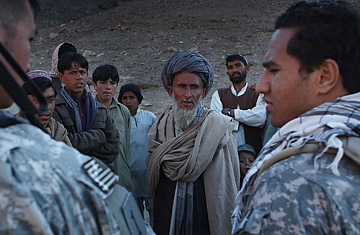
Members of the U.S. Army 1-6 Field Artillery division speak with a village elder on the needs of the community February 26, 2009 in Pigal, Afghanistan.
As the saw goes, never get into a war with a people who live in a half-hour time zone. The reference is usually to Afghanistan, a country no one has ever been able to subdue, for long at least. And it's even more true for the Pashtun, the country's largest ethnic group, who don't seem to live in any time zone at all. Last week the Obama Administration didn't propose going to war with the Pashtun. But a larger American presence in Afghanistan, and the Obama Administration's focus on the Taliban and al-Qaeda elements in the tribal border regions, runs that very risk.
The Administration's instincts are right to work toward some sort of endgame in Afghanistan — train the Afghan army and police, boost economic aid, do something about the corruption and talk to certain elements of the Taliban, making sure they understand we'll be back if al-Qaeda comes back. But it has to happen very quickly. (See pictures of the battle against the Taliban.)
What the Administration must absolutely resist is the temptation of more ambitious goals in Afghanistan, like rooting out the entire Taliban or fostering Western-style democracy. We must never forget that it was al-Qaeda who attacked us and not the Taliban, which is not an international terrorist group. If we make the all-too-common mistake of reducing the Taliban to al-Qaeda, it becomes an open-ended and endless war.
The Obama Administration also needs to put away the dream of sealing the Afghanistan-Pakistan border, where the Pashtun live. It would take half a million troops, not to mention the assistance of many of the Pashtun. Trying halfheartedly to seal the border will only make things worse, quite possibly inciting a larger war with the Pashtun. (View pictures of Pakistan's vulnerable northwest passage.)
The Pashtun are a big, sprawling, insulated tribal people. There are some 40 million of them, but no one knows for sure because the central governments in Kabul and Islamabad have never felt safe enough to take a proper census. The Taliban are overwhelmingly Pashtun. The Pashtun have never had their own country, but they share a common language and identity.
And most importantly, they're willing to shed their blood for each other. The Pashtun have a long history of uniting to face a common, external threat. They held up Alexander the Great for years — if for no other reason than pure belligerence. Something like that seems to be happening today. In February, the Taliban organizations in Pakistan and Afghanistan agreed to put aside their differences, and combine forces to fight NATO in Afghanistan. What incited the alliance was the Obama Administration's plans to send an additional 17,000 troops. (Read "The Truth About Talibanistan.")
What's alarming about a war with the Pashtun is that we know so little about these people. A common complaint among NATO soldiers these days in Afghanistan is the reliance on Tajik translators and intelligence sources. The Tajiks more often than not pass on bogus information that has led to attacks on innocent civilians — often Pahstun whom the Tajiks have little sympathy for.
There's a similar problem with Pakistan. Islamabad is virtually our sole source of American intelligence on the Pashtun in Pakistan. Do we really know whether American Predators are hitting the right targets? Or are they killing Islamabad's enemies rather than America's? Dumping billions of dollars more into Pakistan is not going to improve Pakistani intelligence nor induce Pakistan to become more honest or forthcoming. The best we can hope for is that it helps slow the country's slide into economic chaos.
There's little doubt that if the British had had Cobra helicopters in 1842 it would not have lost its army in Afghanistan. But this shouldn't be cause to throw the history books on the bonfire. After three wars the British never managed to pacify Afghanistan — largely because the Pashtun wouldn't allow them to.
The Obama Administration's surge in Afghanistan needs to be short and sweet and avoid stepping on Pashtun toes. It absolutely must not be the first stage of creating an Afghanistan of our dreams, or else it will most certainly become the one of our nightmares.
Baer, a former CIA field officer assigned to the Middle East, is TIME.com's intelligence columnist and the author of See No Evil and, most recently, The Devil We Know
